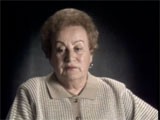You searched for: world%20cup%20v%C3%B2ng%20lo%E1%BA%A1i%E3%80%900242.com%E3%80%91thi%20%C4%91%E1%BA%A5u%20v%C3%B2ng%20lo%E1%BA%A1i%20world%20cup%20c%E1%BB%A7a%20%C4%91%E1%BB%99i%20tuy%E1%BB%83n%20vi%E1%BB%87t%20nam
<< Previous | Displaying results 1531-1540 of 1588 for "world%20cup%20v%C3%B2ng%20lo%E1%BA%A1i%E3%80%900242.com%E3%80%91thi%20%C4%91%E1%BA%A5u%20v%C3%B2ng%20lo%E1%BA%A1i%20world%20cup%20c%E1%BB%A7a%20%C4%91%E1%BB%99i%20tuy%E1%BB%83n%20vi%E1%BB%87t%20nam" | Next >>
-
Thomas Buergenthal describes the plight of refugees today
Oral HistoryJudge Thomas Buergenthal was one of the youngest survivors of the Auschwitz and Sachsenhausen concentration camps. He immigrated to the United States at the age of 17. Judge Buergenthal devoted his life to international and human rights law. He served as chairman of the United States Holocaust Memorial Museum’s Committee on Conscience; was named the Lobingier Professor of Comparative Law and Jurisprudence at the George Washington University Law School; and served for a decade as the American judge at…
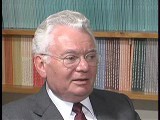
-
Aron (Dereczynski) Derman describes partisan activities near Vilna
Oral HistoryAron was born to a middle-class Jewish family in Slonim, a part of Poland between the two world wars. His parents owned a clothing store. After studying in a technical school, Aron worked as a motion-picture projectionist in a small town near Slonim. The Soviet army took over Slonim in September 1939. War broke out between Germany and the Soviet Union in June 1941. Aron returned to Slonim. The Germans soon occupied Slonim, and later forced the Jews into a ghetto. Aron was forced to work in an armaments…
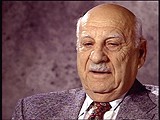
-
Belle Mayer Zeck describes difficult working conditions during the Nuremberg trials
Oral HistoryBelle Mayer trained as a lawyer and worked for the General Counsel of the US Treasury, Foreign Funds Control Bureau. This bureau worked to enforce the Trading With the Enemy Act passed by Congress. In this capacity, Mayer became familiar with the German I. G. Farben chemical company, a large conglomerate that used forced labor during World War II. In 1945, Mayer was sent as a Department of Treasury representative to the postwar London Conference. She was present as representatives from the Allied nations…
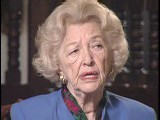
-
Belle Mayer Zeck describes working conditions and staffing at Nuremberg during the postwar trials
Oral HistoryBelle Mayer trained as a lawyer and worked for the General Counsel of the US Treasury, Foreign Funds Control Bureau. This bureau worked to enforce the Trading With the Enemy Act passed by Congress. In this capacity, Mayer became familiar with the German I. G. Farben chemical company, a large conglomerate that used slave labor during World War II. In 1945, Mayer was sent as a Department of Treasury representative to the postwar London Conference. She was present as representatives from the Allied nations…
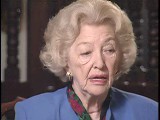
-
Charlene Schiff describes a clandestine school for children in the Horochow ghetto
Oral HistoryBoth of Charlene's parents were local Jewish community leaders, and the family was active in community life. Charlene's father was a professor of philosophy at the State University of Lvov. World War II began with the German invasion of Poland on September 1, 1939. Charlene's town was in the part of eastern Poland occupied by the Soviet Union under the German-Soviet Pact of August 1939. Under the Soviet occupation, the family remained in its home and Charlene's father continued to teach. The Germans…
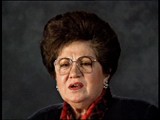
-
Benjamin (Beryl) Ferencz describes collecting evidence against alleged war criminals
Oral HistoryBen was born in a small village in the Carpathian Mountains of Transylvania in Romania. When he was an infant, his family moved to the United States. Ben attended Harvard University, where he studied criminal law. Ben graduated from Harvard University Law School in 1943. He joined a US anti-aircraft artillery battalion that was training in preparation for an Allied invasion of western Europe. At the end of World War II in Europe, Ben was transferred to the war crimes investigation branch of the US Army. He…
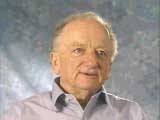
-
Ruth Webber describes the Auschwitz crematoria
Oral HistoryRuth was four years old when the Germans invaded Poland and occupied Ostrowiec. Her family was forced into a ghetto. Germans took over her father's photography business, although he was allowed to continue working outside the ghetto. Before the ghetto was liquidated, Ruth's parents sent her sister into hiding, and managed to get work at a labor camp outside the ghetto. Ruth also went into hiding, either in nearby woods or within the camp itself. When the camp was liquidated, Ruth's parents were split up.…
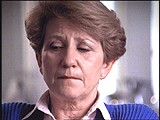
-
Charlene Schiff describes foraging for food in order to survive in forests after escaping from the Horochow ghetto
Oral HistoryBoth of Charlene's parents were local Jewish community leaders, and the family was active in community life. Charlene's father was a professor of philosophy at the State University of Lvov. World War II began with the German invasion of Poland on September 1, 1939. Charlene's town was in the part of eastern Poland occupied by the Soviet Union under the German-Soviet Pact of August 1939. Under the Soviet occupation, the family remained in its home and Charlene's father continued to teach. The Germans…
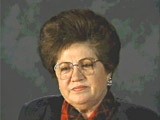
-
Peter Becker describes indoctrination and being in the Hitler Youth
Oral HistoryPeter was six years old when his mother enrolled him in a special Hitler boarding school for future Nazi Party officials in 1935. He studied traditional academic subjects, but was constantly exposed to Nazi ideas and prepared for a military life. Peter was also a member of the Hitler Youth. He came to believe in Hitler as the savior of Germany. Peter would later describe his indoctrination as a subtle process. It took two years after the war had ended for Peter to come to terms with the atrocities that the…
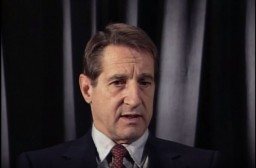
-
Barbara Marton Farkas describes assistance from the Red Cross at the end of the war
Oral HistoryDescribes assistance from the Red Cross at the end of the war
